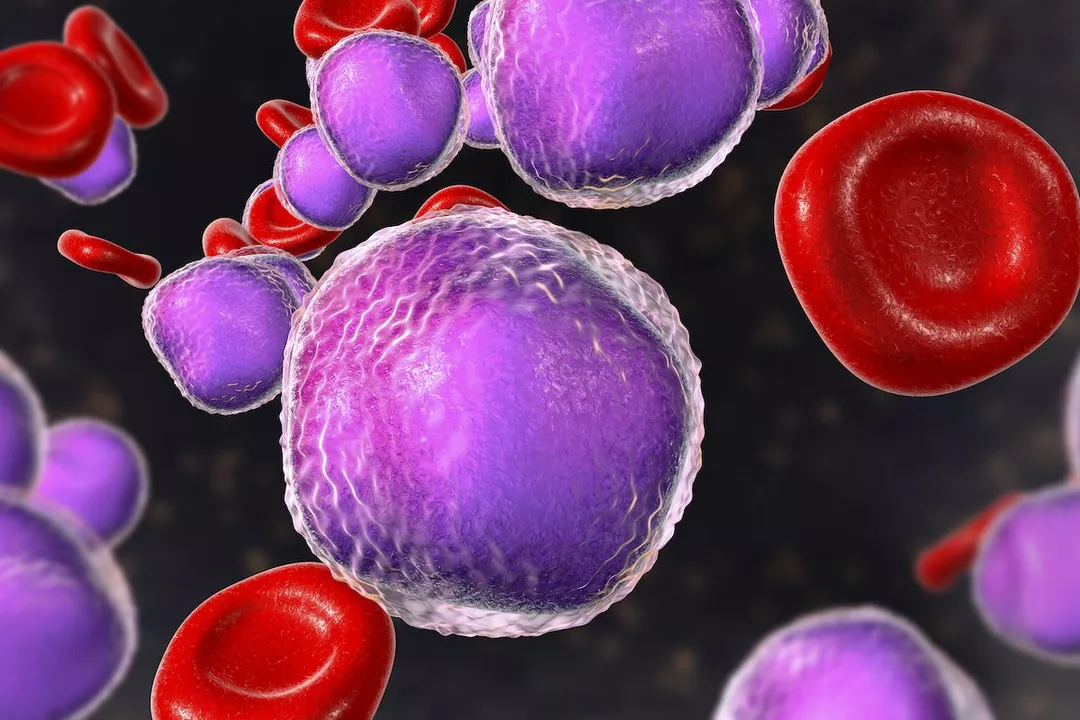Understanding Chromosome-Positive Lymphoblastic Leukemia
Before diving into the role of immunotherapy in treating chromosome-positive lymphoblastic leukemia, it's essential to understand what this type of leukemia is and how it affects the body. Chromosome-positive lymphoblastic leukemia, also known as Philadelphia chromosome-positive leukemia, is a subtype of acute lymphoblastic leukemia (ALL) characterized by the presence of the Philadelphia chromosome. This abnormal chromosome results from a genetic mutation that leads to rapid and uncontrollable growth of immature white blood cells called lymphoblasts.
These immature cells then overcrowd the bone marrow, preventing the production of healthy blood cells and leading to various health complications. Symptoms of this leukemia may include fatigue, fever, weight loss, and increased susceptibility to infections. As a high-risk form of leukemia, chromosome-positive lymphoblastic leukemia requires aggressive and targeted treatment strategies, which is where immunotherapy comes into play.
Immunotherapy: A Promising Treatment Option
Immunotherapy is a cutting-edge treatment approach that harnesses the power of the body's immune system to fight cancer. By stimulating the immune system to recognize and attack cancer cells, immunotherapy offers a targeted and personalized treatment option for patients with various types of cancer, including chromosome-positive lymphoblastic leukemia. In recent years, several immunotherapy-based treatments have been developed and approved for use in treating this aggressive form of leukemia, providing new hope for patients and their families.
The primary goal of immunotherapy is to boost the body's natural defenses to identify and eliminate cancer cells. By doing so, this treatment approach has the potential to minimize side effects typically associated with conventional cancer treatments, such as chemotherapy and radiation therapy.
Types of Immunotherapy for Chromosome-Positive Lymphoblastic Leukemia
There are several types of immunotherapy that have shown promising results in treating chromosome-positive lymphoblastic leukemia. These include:
Monoclonal Antibodies
Monoclonal antibodies are laboratory-made molecules designed to target specific proteins on the surface of cancer cells. By attaching to these proteins, monoclonal antibodies can either directly kill the cancer cells or trigger the immune system to attack them. In the context of chromosome-positive lymphoblastic leukemia, monoclonal antibodies such as blinatumomab have been approved for use in treating relapsed or refractory cases.
Chimeric Antigen Receptor (CAR) T-Cell Therapy
CAR T-cell therapy is a type of immunotherapy that involves genetically engineering the patient's own T cells (a type of immune cell) to recognize and attack cancer cells. In CAR T-cell therapy for chromosome-positive lymphoblastic leukemia, T cells are modified to recognize a specific protein called CD19 found on the surface of leukemia cells. Once the modified T cells are infused back into the patient, they can seek out and kill the cancer cells. Tisagenlecleucel (Kymriah) is an example of a CAR T-cell therapy approved for treating patients with relapsed or refractory chromosome-positive lymphoblastic leukemia.
Immune Checkpoint Inhibitors
Immune checkpoint inhibitors are a class of drugs that help the immune system recognize and attack cancer cells by blocking the inhibitory signals that cancer cells use to evade the immune system. While immune checkpoint inhibitors have shown promising results in various types of cancer, their role in treating chromosome-positive lymphoblastic leukemia is still under investigation through clinical trials.
Combining Immunotherapy with Other Treatments
Immunotherapy is often used in combination with other treatments, such as chemotherapy, radiation therapy, or targeted therapy, to enhance the overall effectiveness of the treatment plan. Combining different treatment modalities can help to attack cancer cells from multiple angles, increasing the chances of achieving a favorable outcome for the patient. In the case of chromosome-positive lymphoblastic leukemia, immunotherapy may be used alongside chemotherapy or tyrosine kinase inhibitors (a type of targeted therapy) to improve response rates and long-term survival.
Managing Side Effects of Immunotherapy
While immunotherapy offers a targeted and personalized approach to treating chromosome-positive lymphoblastic leukemia, it's not without its side effects. Some of the most common side effects associated with immunotherapy include fatigue, fever, chills, and skin reactions at the injection site. More severe side effects, such as cytokine release syndrome (a systemic inflammatory response) and neurologic complications, can also occur, particularly with CAR T-cell therapy.
It's essential for patients and their healthcare team to closely monitor and manage these side effects to ensure the safe and effective use of immunotherapy. In some cases, adjusting the dosage, administering additional medications, or temporarily stopping treatment may be necessary to alleviate side effects.
Understanding the Cost of Immunotherapy
Immunotherapy treatments, particularly CAR T-cell therapy, can be expensive due to the complex and personalized nature of these therapies. The cost of treatment can be a significant burden for patients and their families, making it essential to explore various financial assistance programs and insurance coverage options. It's crucial to discuss the cost of immunotherapy with your healthcare team and seek guidance on the best course of action to secure the necessary funding for treatment.
Looking Forward: The Future of Immunotherapy for Chromosome-Positive Lymphoblastic Leukemia
Immunotherapy has undoubtedly revolutionized the treatment landscape for chromosome-positive lymphoblastic leukemia, offering new hope for patients with this aggressive form of cancer. As research continues to advance, we can expect further developments in immunotherapy approaches, such as the discovery of new targets, the development of novel immunotherapeutic agents, and the optimization of combination strategies. With continued efforts to improve the effectiveness and safety of immunotherapy, the future looks promising for patients with chromosome-positive lymphoblastic leukemia.


Ted Carr
May 28, 2023 AT 04:53Rebecca Parkos
May 29, 2023 AT 22:42Bradley Mulliner
May 31, 2023 AT 19:10Reginald Maarten
June 1, 2023 AT 20:27Jonathan Debo
June 3, 2023 AT 03:23Robin Annison
June 4, 2023 AT 20:50Abigail Jubb
June 5, 2023 AT 15:33George Clark-Roden
June 5, 2023 AT 21:06Hope NewYork
June 6, 2023 AT 21:18Bonnie Sanders Bartlett
June 8, 2023 AT 18:36Melissa Delong
June 10, 2023 AT 15:50Marshall Washick
June 12, 2023 AT 07:48Abha Nakra
June 13, 2023 AT 20:35Neal Burton
June 14, 2023 AT 10:06Tamara Kayali Browne
June 14, 2023 AT 10:36Nishigandha Kanurkar
June 15, 2023 AT 06:53Lori Johnson
June 16, 2023 AT 01:03Albert Schueller
June 16, 2023 AT 05:27Rahul hossain
June 16, 2023 AT 20:50